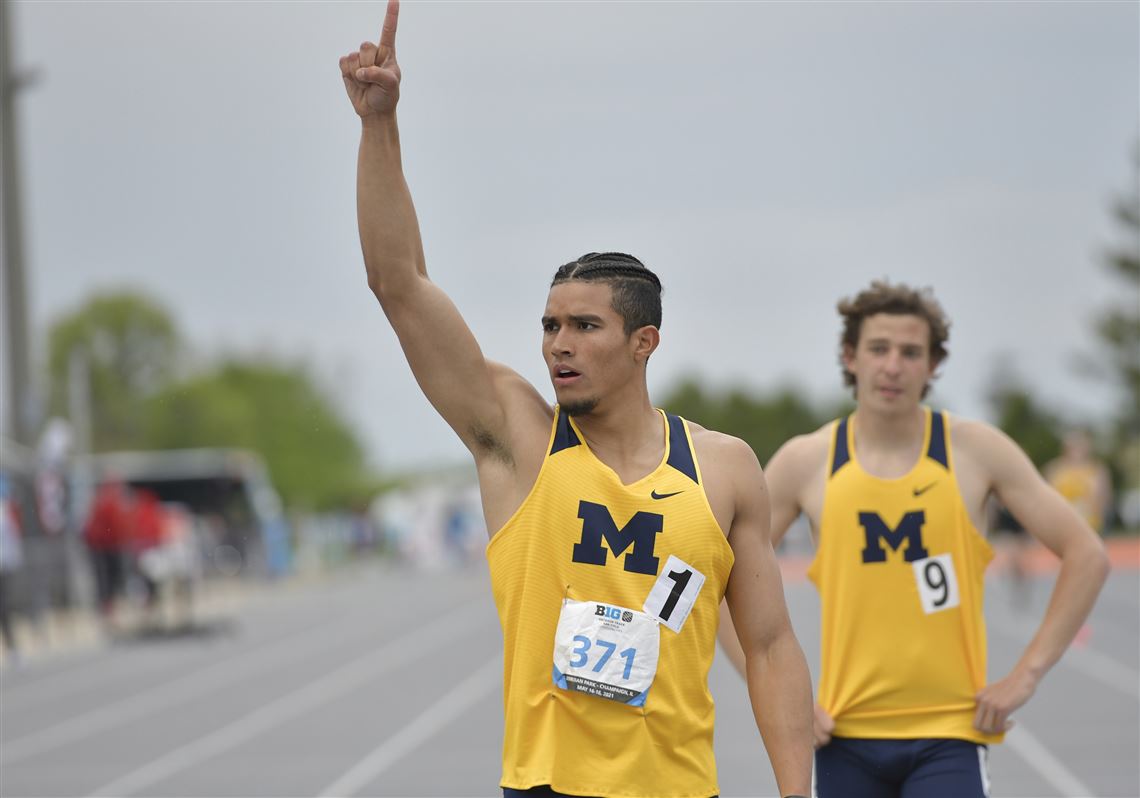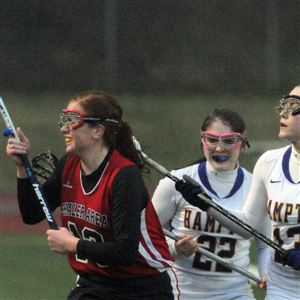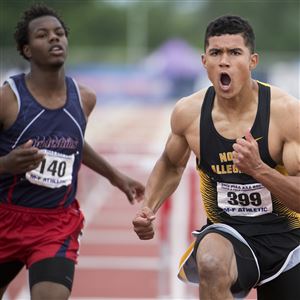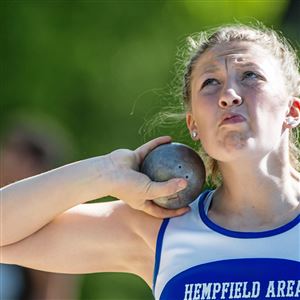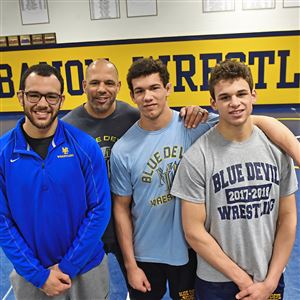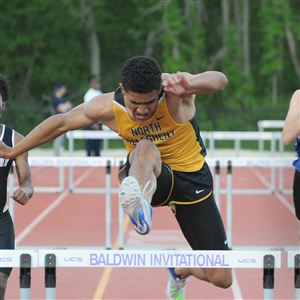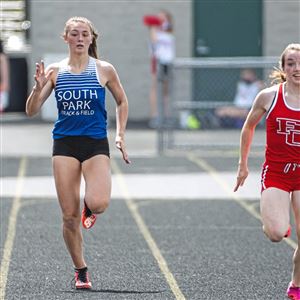Believe it or not, Ayden Owens enters this week’s NCAA East Prelims as the fifth-best decathlete on the planet. Owens, a North Allegheny grad and junior on the Michigan track and field team, is coming off a historic 8,238-point score at the Big Ten championships — obliterating both the Michigan program and Big Ten Conference records. His performance was the fifth-highest total in the world for 2021, moving him to No. 2 among NCAA decathletes.
If you ask him, however, you’ll realize that Owens is only getting started.
“I’m ready to display what I’ve been training for,” he said. “I’ve been doing it for 12 years now so I’m not new to this. I’ve always been patiently putting in the work every day, year after year. Now, I’m reaping the rewards of that a little more recently.”
Oronde S. Sharif can vividly remember those early days 12 years ago. A former Pitt track and field runner himself, he’s now the head coach for Pittsburgh-based Nadia Track Club — the program where Owens was first introduced to the sport as a stubborn little 10-year-old. Sharif remains one of his closest mentors today and has witnessed the work behind the scenes that fueled his meteoric rise to stardom.
“We were at practice and I was working with Ayden’s sisters on the hurdles,” recalled Sharif. “He was just the annoying little brother who came over and told them, ‘You’re not doing this right, you’re not doing that right.’ So we let him try it and he actually did the drill really well. That’s when we knew he was a natural hurdler.”
Owens is much more than a natural hurdler, though.
In addition to 110-meter hurdles, decathletes compete in the 100-, 400- and 1500-meter races, as well as the long jump, high jump, pole vault, discus throw, javelin and shot put field events. Excelling as a decathlete requires extreme athleticism and endurance that often isn’t found in professional sports. Sharif, a lecturer, student advisor and curriculum coordinator at Pitt, teaches a class called The African American Experience in Sports. With several student athletes in his class each semester, he conducts open debates about which sport requires the most athleticism.
“Most of them will say football or basketball players,” he said. “I’m like, ‘Nah, anybody can catch a football. You can teach anybody to play basketball, they don’t necessarily have to be good at it [to start]. When you’re looking at athletic feats — decathletes, to me, are the most athletic people. They do everything.”
Owens has always possessed that level of athletic ability. Sharif remembers Owens’ mom sharing stories about his youth football and basketball coaches just giving him the ball and telling him to go score. Track was a different story. It was the first sport that forced Owens to rely on more than just his raw talent — even as a pre-teen.
“He won all the events at our association championship and regional meet,” said Sharif. “Then, he came in second at nationals in the pentathlon. He was usually towering over other kids, but the kid that won was towering over him. They were No. 1 and 2 the whole way.
“We thought Ayden would blow him out in the 1500-meter race, but he didn’t. He actually threw up while he was running and still finished second. That was an early sign of somebody who had the athletic ability as well as the mental fortitude.”
Fast forwarding to now, Owens’ mental fortitude has only grown stronger. After a standout freshman season at the University of Southern California that garnered him Pac 12 Freshman of the Year, he made one of the hardest decisions of his life in transferring to Michigan due to coaching turnover within the USC program. Suddenly, he was immersed in a different school, a different track program, a different academic environment and even a different climate.
“I definitely miss the sunshine of Southern California,” said Owens. “You lose your friend group. You lose your freshman experience. You’re around a new culture and new people. I even had a new major. Everything changed in my life. I thought it was going to be a smoother transition than it was. I kind of underestimated it. When I got here, I was injured and couldn’t even train with the team.”
That experience played an instrumental role in pushing Owens to the pinnacle of the sport.
“I think that was necessary to mature me in a lot of ways,” he said. “When everything’s going well you can’t complain. But whenever you hit a little bit of adversity, it turns you from a boy into a man.”
On the track, Owens certainly resembles a man among boys — even while competing against some of the best athletes the NCAA has to offer. His astounding score at the Big Ten title meet qualified him for the NCAA outdoor track and field national championships in Eugene, Ore., set to take place on June 9-12 after the East Prelims. That means he’ll have two opportunities to post an “Olympic Standard” score of 8,350 points in order to qualify for the 2021 Olympics in Tokyo.
Upon qualifying, he’d represent Puerto Rico in the Olympic Games. Owens was born in the United States to a Puerto Rican mother and African-American father. However, several of his aunts, uncles and cousins still live on the island.
“I think it means a lot to my mom,” he said. “Just to stay connected with the culture. A lot of times when you live in the United States, it’s expected that you’ll be on Team USA. For me to race for her roots and her heritage, she was super proud of me for making that decision. There’s a sacrifice. A lot of people asked me, ‘Man, what are you doing? You’re abandoning the U.S.’ Nah, I’m embracing my own culture and my own heritage.
“It meant more to the people on the island than it would for me to represent the U.S. I just felt like doing something for a small country which had been through so much with the hurricanes and natural disasters and things like that. Bringing pride to them would be more meaningful.”
Owens said he has been in constant contact with the Puerto Rican Olympic Committee and the Athletic Federation of Puerto Rico about representing them in the upcoming Olympics. All that’s left is for him to qualify, which is only a matter of 112 more points. Then, he’ll have an opportunity to write the next chapter of his legacy.
“I think he can be a world record holder,” said Sharif. “If everything goes the way we’ve talked about over the years, he has the potential to be a 10,000-point scorer. There’s definitely some work that has to be done. ... He steps up in big moments, but he’ll really need to take on some of those field events. Running events? Those are the easy part, but connecting the dots on the field events will really push him to the next level.
“There’s only a couple people in the world right now who have the potential to score 10,000 points. I think he’s one of them.”
For as much as he represents his Puerto Rican heritage, Owens is just as passionate about his Pittsburgh roots. He makes the most of each and every chance to boast about “The City of Champions” among his peers in Ann Arbor. One day claiming Olympic gold would solidify him as one of the greats, putting him in the same sentence as some of the athletes who have shaped his city’s championship legacy.
However, he’d ultimately resemble a superior type of champion.
“I want to be a member on that list, hopefully the best athlete on that list,” he said. “I wouldn’t be the typical athlete, but I’d be an Olympic champ.”
First Published: May 26, 2021, 10:00 a.m.
Updated: May 26, 2021, 10:24 a.m.







